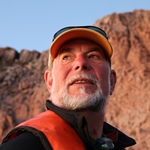
Jeff Campbell
Jeff Campbell fell in love with the ocean while attending boatbuilding school in Eastport, Maine. Since completing his MS in Marine and Estuarine Science at Western Washington University, he has worked for NOAA documenting the ecological impacts of transoceanic fiber-optic cable; the Washington Department of Fish & Wildlife developing an aging method for sixgill sharks; the Lummi Tribe as a Harvest Biologist; Northwest Indian College teaching Fisheries and Wildlife Biology, and as a volunteer for the Whatcom County Marine Mammal Stranding Network. He has been involved in research developing mitigation methods for harmful algae blooms, sterilization methods for oil tanker ballast water, and techniques for screening refinery effluent for harmful ecological effects. He also served as Principle Director on a USDA-funded grant using student interns to study the impact of nutrient-rich run-off on seasonal dead-zones in Bellingham Bay.
Jeff is passionate about the marine environment, particularly the northeast Pacific, and believes that the key to preserving this fragile biome is lighting the spark in others by sharing his knowledge on the interconnectedness of seemingly disparate systems. He is particularly interested in the effects of ocean acidification on the larval stages of mollusk, and arthropod larvae.
Summers for the last three years have found him driving expedition landing craft and sharing the joys of whale watching with guests. A Lummi Island, Washington resident for more than 18 years, Jeff lives with his wife Penny, who has been a marine naturalist on whale watch boats in the Salish Sea for many years, and their cat, Boo.
